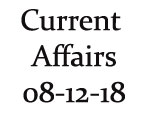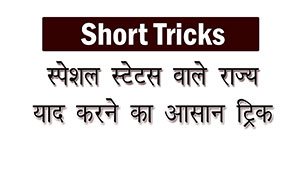-
Current Affairs 8th December 2018
Updated : 08-Dec-2018
Current Affairs 8th December 2018 - Important Points
- 24 poets and authors 2018 Sahitya Akademi Award
- RBI to introduce Ombudsman Scheme for Digital Transactions
- Cabinet approves Agriculture Export Policy 2018 to double farmer's income by 2022
- Earlier Indian diplomat Preeti Saran designated to UN's Committee on Economic, Social and Cultural Right
- Cabinet approves National Mission on Interdisciplinary Cyber-Physical Systems
- UN launches new outline to combat international terrorism
Current Affairs 8th December 2018 - Details
24 poets and authors 2018 Sahitya Akademi Award
India’s national academy of letters ‘Sahitya Academy’ has declared names of 24 poets and authors who will be awarded the prestigious 2018 Sahitya Akademi Award in 24 various Indian languages. The award has considered premier works in 24 Indian languages that consists 7 books of poetry, 6 novels, 6 short stories, 3 of literary criticism and 2 of essays.
The awards will be given at a roadshow function to be organised on January 29 coming year at New Delhi during Festival of Letters to be held by Sahitya Akademi. The awardees were suggested by distinguished jury members from 24 languages and were sanctioned by Executive Board under chairmanship of President Sahitya Akademi Dr. Chandrashekhar Kambar.
Awardees
- Poetry: Sananta Tanti in Assamese, Paresh Narendra Kamat in Konkani, S Ramesan Nair in Malayalam, Dr.Rama Kant Shukla in Sanskrit, Dr. Mohanjit in Punjabi, Dr.Rajesh Kumar Vyas in Rajasthani and Khiman U Mulani in Sindhi languages respectively.
- Short stories: Sanjib Chattopadhyay in Bengali, Mushtaq Ahmed Mushtaq in Kashmiri, Prof.Bina Thakur in Maithili, Rituraj Basumatary in Bodo, Prof.Budhichandra Heisnamba in Manipuri and Nath Upadhyay Chapagain in Nepali languages respectively.
- Novel: Inderjeet Kesar in Dogri, Anees Salim in Englis, Chitra Mudgal in Hindi, Shyam Besra in Santali, Ramkrishnan in Tamil and Rahman Abbas in Urdu languages respectively.
- Literary Criticism: KG Nagarajappa in Kannada, Ma.Su. Patil in Marathi and Prof.Dasarathi Das in Odia languages respectively.
- Essays: Prof.Sharifa Vijliwala in Gujarati and Dr. Kolakaluri Enoch in Telugu languages individually.
Bhasha Salman 2017 and 2018
Sahitya Akademi also declared its Bhasha Salman for year 2017 & 2018. Yogendra Nath Sharma was bestowed for North zone; Gagendra Nath Das for Eastern zone; G Venkatasubbiah for South zone; and Shailaja Bapat for Western zone respectively.
RBI to introduce Ombudsman Scheme for Digital Transactions
RBI has declared to introduce ‘Ombudsman Scheme for Digital Transactions’ to deliver cost-free process to redress grievances of customers related to digital transactions. The scheme will be informed by end of January 2019. It will have services provided by parties falling under Reserve Bank of India’s regulatory jurisdiction.
The scheme is being applied taking into consideration increase in digital financial transactions which is gaining traction in the nation. There is emerging necessity for dedicated, cost-free and expeditious grievance redressal process for powering consumer confidence in this channel.
Framework for limiting customer liability
Reserve Bank of India has also decided to come out with outlay for limiting customer liability in concern of unauthorised electronic payment transactions involving pre-paid payment instruments. It already has released instructions on limiting customer liability in concern of unauthorised electronic transactions involving banks & credit card delivering non-banking financial companies.
This outlay will bring all users up to same level with regard to electronic transactions done by them and extend advantages of limiting customer liability for unauthorised electronic transactions involving pre-paid payment instruments issued by other entities not covered by extant rules. The rules will be published by end of December 2018.
Cabinet approves Agriculture Export Policy 2018 to double farmer's income by 2022
The Union Cabinet, led by PM Narendra Modi, on December 6th, 2018 sanctioned the Agriculture Export Policy 2018, which goals to double-fold farmer's revenue by 2022.
The Cabinet has also sanctioned the proposal for formation of Monitoring Outline at Centre with Ministry of Commerce as the nodal Department with representation from numerous Ministries, agencies and representatives of related State Governments to oversee the execution of the Policy.The Policy will double-fold the agricultural exports and integrate Indian farmers & agricultural produce with the global value chains. Exports of agricultural produce would play a key role in achieving the goal of doubling farmers’ revenue by 2022.
Objectives
- To double-fold agricultural exports from current estimated USD 30+ billion to estimated USD 60+ billion by 2022 and reach USD 100 billion in the next few years thereafter.
- To diversify export basket, export destinations and boost high-value & value-added agricultural exports including emphasis on perishables
- To promote indigenous, organic, ethnic, traditional as well as non-traditional agricultural produce exports.
- To deliver an institutional process for pursuing market access, tackling barriers and dealing with sanitary and phyto-sanitary matters.
- To double-fold India’s share in world agriculture exports by mixing with global value chain at the earliest
- Enable farmers to get advantage of export opportunities in foreign market
Earlier Indian diplomat Preeti Saran designated to UN's Committee on Economic, Social and Cultural Rights
An earlier senior Indian envoy, Preeti Saran was on December 6th, 2018 designated unopposed to an Asia Pacific seat on the UN’s Committee on Economic, Social and Cultural Rights- CESCR.
The United Nation's Economic and Social Council designated Saran to the 18 membered committee “Committee on Economic, Social and Cultural Rights” for a 4 years term beginning on January 1st, 2019.
Saran will start her term at Committee on Economic, Social and Cultural Rights after another earlier Indian diplomat Chandrashekhar Dasgupta finishes his 3rd term on the Committee on Economic, Social and Cultural Rights by the end of December 2018.
In November 2018, India nominated Saran for the Asia Pacific seat on the Council. Her nomination was circulated to United Nations members by Secretary-General Antonio Guterres on November 23rd, paving the way for election.Committee on Economic, Social and Cultural Rights
- The Committee on Economic, Social and Cultural Rights was formed in 1985 by the Economic and Social Council of the UN.
- It was constituted with an aim to monitor on its behalf the execution of the International Covenant on Economic, Social and Cultural Rights, which has been ratified by 169 nations.
- The nations that are parties to the covenant are obligatory to submit reports to the Committee on Economic, Social and Cultural Rights every 5 years on how they safeguard the economic, social and cultural rights.
- The committee inspects each report and addresses its concerns and commendations to the State party in the form of concluding remarks.
- The Members of the Committee on Economic, Social and Cultural Rights serve in their personal capacities as specialists and do not represent their nations even though they may be nominated by their own nation.
- The Committee on Economic, Social and Cultural Rights meets in Geneva and plans 2 sessions every year, consisting of a 3-week plenary and a 1-week pre-sessional working group.
Cabinet approves National Mission on Interdisciplinary Cyber-Physical Systems
The Union Cabinet led by PM Narendra Modi on December 6th, 2018 sanctioned the initiation of National Mission on Interdisciplinary Cyber-Physical Systems.
The mission will be released by the Department of Science & Technology at an anticipated cost of Rupees 3660 crore for a period of 5 years.Aim
The mission addresses the ever-raising technological needs of the society and takes into account the international trends and roadmaps of leading nations for the upcoming generation technologies.
Important Highlights
The National Mission on Interdisciplinary Cyber-Physical Systems is a comprehensive mission that would address technology expansion, application expansion, human resource expansion and skill enhancement, entrepreneurship and start-up expansion in Cyber Physical Systems and related technologies.
The mission goals to start Fifteen Technology Innovation Hubs, Six Application Innovation Hubs and Four Technology Translation Research Parks.
The hubs and research parks will have 4 emphasised areas along which the mission execution would proceed, which include:
(1) Technology Expansion
(2) Human Resource Development and Skill Expansion
(3) Innovation, Entrepreneurship and Start-ups Ecosystem Expansion
(4) International Collaborations
Further, these hubs and research parks will join to academics, industry, central ministries and state government in developing solutions at reputed academic, research and expansion and other firms across the nation in a hub and spoke model.
For the same, a strategic approach involving a appropriate mix of academic, industry and government has been proposed to be accepted.
The strong steering and monitoring processes in the form of Mission Governing Board, Inter-Ministerial Co-ordination Committee, Scientific Advisory Committee and other Sub-Committees will guide and monitor the mission accomplishment.UN launches new outline to combat international terrorism
The United Nations Secretary-General Antonio Guterres on December 6th, 2018 released a new outline called “United Nations Global Counter-Terrorism Co-ordination Compact” to fight against international terrorism and direct efforts across the peace & security, humanitarian, human rights and sustainable expansion sectors.
The outline is a pact between the United Nations chief, 36 organisational entities, the International Criminal Police Organisation- INTERPOL and the World Customs Organisation to better assist the needs of member states when it comes to handling the scourge of international terrorism.
UN Outline Important HighlightsThe Co-ordination Committee of the UN will oversee the execution of the outline and monitor its execution. The committee is led by United Nations Under-Secretary-General for combat terrorism, Vladimir Voronkov.
During the 1st meeting of the outline’s Co-ordination Committee, the committee also deliberated strategic priorities for the upcoming 2 years, based on the 6th review of the Global Counter-Terrorism Strategy, appropriate Security Council resolutions and United Nations Counter-Terrorism Executive Directorate valuations as well as the appeals from member states for technical assistance.
The committee also observed the organisation of work and ideas to improve the delivery of an 'All-of- United Nations' capacity-building assistance to the member states.
The United Nations Global Counter-Terrorism Co-ordination Compact Task Force will replace the Counter-Terrorism Execution Task Force, which was started in 2005 to fortify United Nations system-wide co-ordination and coherence of combat terrorism efforts.














